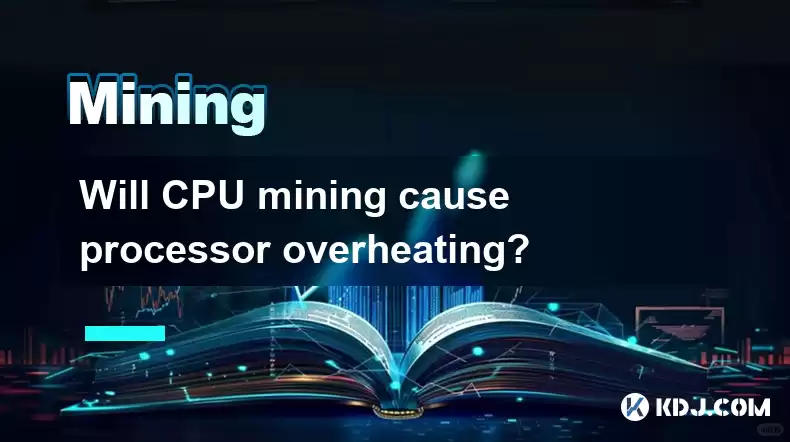-
 bitcoin
bitcoin $87959.907984 USD
1.34% -
 ethereum
ethereum $2920.497338 USD
3.04% -
 tether
tether $0.999775 USD
0.00% -
 xrp
xrp $2.237324 USD
8.12% -
 bnb
bnb $860.243768 USD
0.90% -
 solana
solana $138.089498 USD
5.43% -
 usd-coin
usd-coin $0.999807 USD
0.01% -
 tron
tron $0.272801 USD
-1.53% -
 dogecoin
dogecoin $0.150904 USD
2.96% -
 cardano
cardano $0.421635 USD
1.97% -
 hyperliquid
hyperliquid $32.152445 USD
2.23% -
 bitcoin-cash
bitcoin-cash $533.301069 USD
-1.94% -
 chainlink
chainlink $12.953417 USD
2.68% -
 unus-sed-leo
unus-sed-leo $9.535951 USD
0.73% -
 zcash
zcash $521.483386 USD
-2.87%
Will CPU mining cause processor overheating?
CPU mining generates heat, risking overheating and damage. Cooling, monitoring temperatures, and choosing less intensive coins are crucial for mitigation; understand your hardware's limits to prevent irreversible harm.
Mar 19, 2025 at 11:14 pm

- CPU mining generates heat, the intensity depending on the coin mined, the CPU's capabilities, and ambient temperature.
- Overheating risks are real and can damage your CPU. Proper cooling is crucial.
- Factors influencing overheating include CPU load, ambient temperature, and cooling system efficiency.
- Mitigation strategies include using efficient cooling solutions, monitoring temperatures, and choosing less intensive coins to mine.
- Understanding your hardware limitations is vital to avoid damage.
The short answer is: yes, CPU mining can cause processor overheating. The extent of the overheating depends on several interacting factors. While some CPUs handle the increased thermal load better than others, the process of continuously performing complex calculations for cryptocurrency mining generates significant heat. This heat must be effectively dissipated to prevent damage. Ignoring this risk can lead to irreversible hardware damage.
The intensity of heat generated during CPU mining is directly proportional to the computational power demanded by the mining algorithm. Mining more computationally intensive cryptocurrencies, like Monero (XMR) which relies heavily on CPU power, will produce considerably more heat than mining less demanding coins. The specific algorithm and its optimization for your CPU will also influence the heat output.
Your CPU's capabilities also play a significant role. A newer, high-end CPU with better thermal design and higher TDP (Thermal Design Power) will naturally handle the heat load better than an older, lower-end processor. A CPU with a lower TDP is more likely to overheat during intense mining operations. Furthermore, the age and condition of your thermal paste significantly impacts heat transfer efficiency. Old, dried-out thermal paste will lead to higher CPU temperatures.
Ambient temperature is another crucial factor. Mining in a hot environment will exacerbate the problem. If the room temperature is already high, the CPU will struggle to dissipate heat effectively, leading to increased temperatures and a greater risk of overheating. A well-ventilated area is therefore crucial for successful and safe CPU mining.
The effectiveness of your CPU's cooling system is paramount. A high-quality cooler, whether it's a stock cooler or an aftermarket heatsink and fan, is vital for managing the increased heat load. Insufficient cooling leads to higher temperatures, which can throttle your CPU performance (reducing mining efficiency) and eventually cause damage.
Several steps can be taken to mitigate the risk of CPU overheating during mining. First, ensure your cooling system is adequate. Consider upgrading to a better cooler if necessary. Regularly cleaning the dust from your CPU heatsink and fan will also improve cooling efficiency. Monitoring CPU temperatures using software like HWMonitor or Core Temp is crucial. This allows you to track temperatures in real-time and intervene if temperatures exceed safe operating limits.
- Upgrade your cooling solution: Invest in a high-quality CPU cooler, such as a larger heatsink with a more powerful fan or a liquid cooler.
- Improve airflow: Ensure your computer case has adequate ventilation. Consider adding additional case fans to improve airflow.
- Monitor CPU temperatures: Use monitoring software to keep a close eye on your CPU temperature during mining operations.
- Reduce mining intensity: Consider mining less computationally intensive cryptocurrencies.
- Overclocking caution: Avoid overclocking your CPU, as this will significantly increase heat generation.
- Regular maintenance: Keep your computer case clean and free of dust to ensure optimal cooling.
Understanding your CPU's thermal limits is essential. Consult your CPU's specifications to determine its maximum safe operating temperature (TjMax). Never let your CPU exceed this temperature. Prolonged exposure to excessive heat can lead to irreversible damage, potentially rendering your CPU unusable.
Frequently Asked Questions:Q: What are the signs of CPU overheating during mining?A: Signs include the system shutting down unexpectedly, erratic behavior, slow performance, and unusually high fan speeds. Monitoring software will show drastically elevated temperatures.
Q: Can I use a laptop for CPU mining?A: Yes, but it carries a higher risk of overheating due to the often limited cooling solutions in laptops. Close monitoring is critical.
Q: What happens if my CPU overheats while mining?A: Overheating can lead to reduced performance, system instability, and ultimately, permanent hardware damage. In severe cases, the CPU can be destroyed.
Q: How often should I monitor my CPU temperature while mining?A: It's best to monitor it constantly using monitoring software. Regular checks, even every few hours, are important.
Q: What cryptocurrencies are less intensive on the CPU?A: This depends on the algorithm but some coins are generally less intensive than others. Researching algorithms is crucial to finding less demanding options.
Q: Is it worth CPU mining in 2024?A: Profitability is highly variable and depends on many factors, including electricity costs, hardware capabilities, and cryptocurrency prices. It's essential to calculate your potential profit before starting. The risks of damage need to be weighed against the potential rewards.
Disclaimer:info@kdj.com
The information provided is not trading advice. kdj.com does not assume any responsibility for any investments made based on the information provided in this article. Cryptocurrencies are highly volatile and it is highly recommended that you invest with caution after thorough research!
If you believe that the content used on this website infringes your copyright, please contact us immediately (info@kdj.com) and we will delete it promptly.
- The Algorithmic Heartbeat: AI Agents Optimize for Love in a Digital Wild West
- 2026-02-09 01:00:02
- Royal Mint 50p Coin: Rare Listing for Peter Rabbit Sparks Collecting Frenzy (and Caution)
- 2026-02-08 22:30:02
- Markets at a 2026 Turning Point: Navigating Volatility and Shifting Narratives
- 2026-02-08 22:15:01
- Bitcoin's Big Dip: Navigating the Crypto Market's Latest Volatility Wave
- 2026-02-08 22:10:02
- RWA Yacht Charter Hits the High Seas: Investing Yachts Docks Innovation with Tokenized Luxury
- 2026-02-08 22:20:02
- Bitcoin Mining Difficulty Plummets 11% in Largest Drop Since China Ban, Fueled by Price Slump and U.S. Storms
- 2026-02-08 22:00:01
Related knowledge

How to mine crypto sustainably in 2026?
Feb 07,2026 at 04:20pm
Energy Source Optimization1. Miners increasingly deploy solar arrays directly on warehouse rooftops to power ASIC rigs during daylight hours. 2. Geoth...

How to mine Conflux on a standard gaming laptop?
Feb 07,2026 at 04:19am
Hardware Requirements for Conflux Mining1. Conflux uses a proof-of-work consensus mechanism called Tree-Graph, which is designed to be ASIC-resistant ...

How to buy hashing power on cloud mining platforms?
Feb 08,2026 at 05:59pm
Understanding Cloud Mining Contracts1. Cloud mining platforms offer users the ability to rent hashing power without owning or maintaining physical har...

How to mine Flux with a 30-series Nvidia GPU?
Feb 07,2026 at 02:40pm
Market Volatility Patterns1. Bitcoin price movements often exhibit sharp intraday swings exceeding 5% during low-liquidity windows, particularly betwe...

How to pay taxes on crypto mining income in 2026?
Feb 07,2026 at 01:20am
Tax Classification of Mining Rewards1. Cryptocurrency received as mining rewards is treated as ordinary income by most major tax jurisdictions includi...

How to find the lowest fee mining pools for BTC?
Feb 07,2026 at 01:00pm
Fee Structure Transparency1. Most reputable BTC mining pools publish their fee schedules directly on their official websites, often under sections lab...

How to mine crypto sustainably in 2026?
Feb 07,2026 at 04:20pm
Energy Source Optimization1. Miners increasingly deploy solar arrays directly on warehouse rooftops to power ASIC rigs during daylight hours. 2. Geoth...

How to mine Conflux on a standard gaming laptop?
Feb 07,2026 at 04:19am
Hardware Requirements for Conflux Mining1. Conflux uses a proof-of-work consensus mechanism called Tree-Graph, which is designed to be ASIC-resistant ...

How to buy hashing power on cloud mining platforms?
Feb 08,2026 at 05:59pm
Understanding Cloud Mining Contracts1. Cloud mining platforms offer users the ability to rent hashing power without owning or maintaining physical har...

How to mine Flux with a 30-series Nvidia GPU?
Feb 07,2026 at 02:40pm
Market Volatility Patterns1. Bitcoin price movements often exhibit sharp intraday swings exceeding 5% during low-liquidity windows, particularly betwe...

How to pay taxes on crypto mining income in 2026?
Feb 07,2026 at 01:20am
Tax Classification of Mining Rewards1. Cryptocurrency received as mining rewards is treated as ordinary income by most major tax jurisdictions includi...

How to find the lowest fee mining pools for BTC?
Feb 07,2026 at 01:00pm
Fee Structure Transparency1. Most reputable BTC mining pools publish their fee schedules directly on their official websites, often under sections lab...
See all articles





















![Is This a REAL Reversal or Fake out?? I wouldn't Get Excited Just Yet... [20 Min emergency stream] Is This a REAL Reversal or Fake out?? I wouldn't Get Excited Just Yet... [20 Min emergency stream]](/uploads/2026/02/08/cryptocurrencies-news/videos/origin_698897450a654_image_500_375.webp)


![Mesocosmos (By Biskotos) [All Coins] | Geometry Dash Mesocosmos (By Biskotos) [All Coins] | Geometry Dash](/uploads/2026/02/08/cryptocurrencies-news/videos/origin_69889be2eac64_image_500_375.webp)

















































